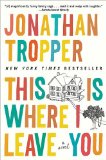Summary | Excerpt | Reading Guide | Reviews | Beyond the Book | Readalikes | Genres & Themes | Author Bio

Critics' Opinion:
Readers' Opinion:
First Published:
Aug 2009, 352 pages
Paperback:
Jul 2010, 352 pages
 Book Reviewed by:
Book Reviewed by:
Donna Chavez
Buy This Book
Chapter 1
Dad’s dead," Wendy says off handedly, like it’s happened before, like it happens every day. It can be grating, this act of hers, to be utterly unfazed at all times, even in the face of tragedy. "He died two hours ago."
"How’s Mom doing?"
"She’s Mom, you know? She wanted to know how much to tip the coroner."
I have to smile, even as I chafe, as always, at our family’s patented inability to express emotion during watershed events. There is no occasion calling for sincerity that the Foxman family won’t quickly diminish or pervert through our own genetically engineered brand of irony and evasion. We banter, quip, and insult our way through birthdays, holidays, weddings, illnesses. Now Dad is dead and Wendy is cracking wise.
It serves him right, since he was something of a pioneer at the forefront of emotional repression.
"It gets better," Wendy says.
"Better? Jesus, Wendy, do you hear yourself?"
"Okay, that came out wrong."
"You think?"
"He asked us to sit shiva."
"Who did?"
"Who are we talking about? Dad! Dad wanted us to sit shiva."
"Dad’s dead."
Wendy sighs, like it’s positively exhausting having to navigate the dense forest of my obtuseness. "Yes, apparently, that’s the optimal time to do it."
"But Dad’s an atheist."
"Dad was an atheist."
"You’re telling me he found God before he died?"
"No, I’m telling you he’s dead and you should conjugate your tenses accordingly."
If we sound like a couple of callous assholes, it’s because that’s how we were raised. But in fairness, we’d been mourning for a while already, on and off since he was first diagnosed a year and a half earlier. He’d been having stomachaches, swatting away my mother’s pleas that he see a doctor, choosing instead to increase the regimen of the same antacids he’d been taking for years. He popped them like Life Savers, dropping small squibs of foil wrapping wherever he went, so that the carpets glittered like wet pavement. Then his stool turned red.
"Your father’s not feeling well," my mother understated over the phone.
"My shit’s bleeding," he groused from somewhere behind her. In the fifteen years since I’d moved out of the house, Dad never came to the phone. It was always Mom, with Dad in the background, contributing the odd comment when it suited him. That’s how it was in person too. Mom always took center stage. Marrying her was like joining the chorus.
On the CAT scan, tumors bloomed like flowers against the charcoal desert of his duodenal lining. Into the lore of Dad’s legendary stoicism would be added the fact that he spent a year treating metastatic stomach cancer with Tums. There were the predictable surgeries, the radiation, and then the Hail Mary rounds of chemo meant to shrink the tumors but that instead shrank him, his once broad shoulders reduced to skeletal knobs that disappeared beneath the surface of his slack skin.
Then came the withering of muscle and sinew and the sad, crumbling descent into extreme pain management, culminating with him slipping into a coma, the one we knew he’d never come out of. And why should he? Why wake up to the painful, execrable mess of end-stage stomach cancer? It took four months for him to die, three more than the oncologists had predicted. "Your dad’s a fighter," they would say when we visited, which was a crock, because he’d already been soundly beaten. If he was at all aware, he had to be pissed at how long it was taking him to do something as simple as die. Dad didn’t believe in God, but he was a life- long member of the Church of Shit or Get Off the Can.
So his actual death itself was less an event than a final sad detail.
Excerpted from This Is Where I Leave You by Jonathan Tropper. Copyright © 2009 by Jonathan Tropper. Excerpted by permission of Dutton. All rights reserved. No part of this excerpt may be reproduced or reprinted without permission in writing from the publisher.





The Flower Sisters
by Michelle Collins Anderson
From the new Fannie Flagg of the Ozarks, a richly-woven story of family, forgiveness, and reinvention.

The House on Biscayne Bay
by Chanel Cleeton
As death stalks a gothic mansion in Miami, the lives of two women intertwine as the past and present collide.

The Funeral Cryer by Wenyan Lu
Debut novelist Wenyan Lu brings us this witty yet profound story about one woman's midlife reawakening in contemporary rural China.
Your guide toexceptional books
BookBrowse seeks out and recommends the best in contemporary fiction and nonfiction—books that not only engage and entertain but also deepen our understanding of ourselves and the world around us.